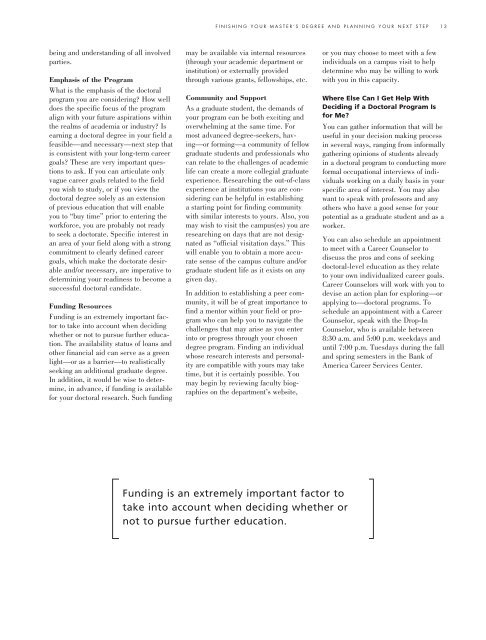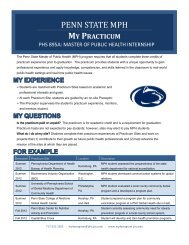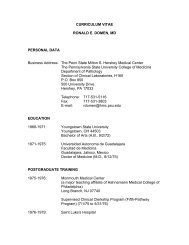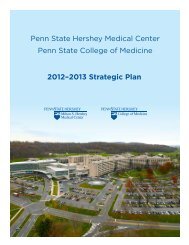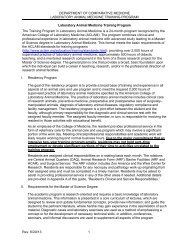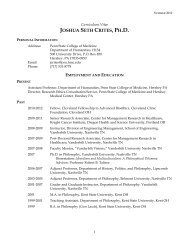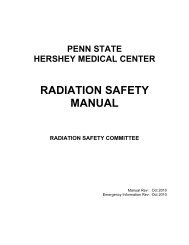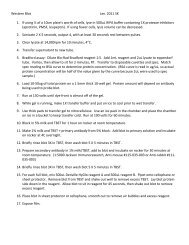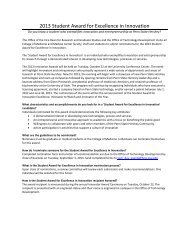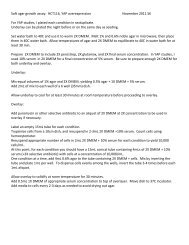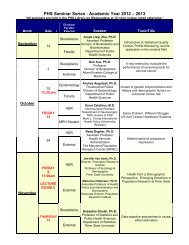Penn State Graduate Student Career Guide - Biomedical Sciences ...
Penn State Graduate Student Career Guide - Biomedical Sciences ...
Penn State Graduate Student Career Guide - Biomedical Sciences ...
You also want an ePaper? Increase the reach of your titles
YUMPU automatically turns print PDFs into web optimized ePapers that Google loves.
FINISHING YOUR MASTER’S DEGREE AND PLANNING YOUR NEXT STEP 13<br />
being and understanding of all involved<br />
parties.<br />
Emphasis of the Program<br />
What is the emphasis of the doctoral<br />
program you are considering? How well<br />
does the specific focus of the program<br />
align with your future aspirations within<br />
the realms of academia or industry? Is<br />
earning a doctoral degree in your field a<br />
feasible—and necessary—next step that<br />
is consistent with your long-term career<br />
goals? These are very important questions<br />
to ask. If you can articulate only<br />
vague career goals related to the field<br />
you wish to study, or if you view the<br />
doctoral degree solely as an extension<br />
of previous education that will enable<br />
you to “buy time” prior to entering the<br />
workforce, you are probably not ready<br />
to seek a doctorate. Specific interest in<br />
an area of your field along with a strong<br />
commitment to clearly defined career<br />
goals, which make the doctorate desirable<br />
and/or necessary, are imperative to<br />
determining your readiness to become a<br />
successful doctoral candidate.<br />
Funding Resources<br />
Funding is an extremely important factor<br />
to take into account when deciding<br />
whether or not to pursue further education.<br />
The availability status of loans and<br />
other financial aid can serve as a green<br />
light—or as a barrier—to realistically<br />
seeking an additional graduate degree.<br />
In addition, it would be wise to determine,<br />
in advance, if funding is available<br />
for your doctoral research. Such funding<br />
may be available via internal resources<br />
(through your academic department or<br />
institution) or externally provided<br />
through various grants, fellowships, etc.<br />
Community and Support<br />
As a graduate student, the demands of<br />
your program can be both exciting and<br />
overwhelming at the same time. For<br />
most advanced degree-seekers, having—or<br />
forming—a community of fellow<br />
graduate students and professionals who<br />
can relate to the challenges of academic<br />
life can create a more collegial graduate<br />
experience. Researching the out-of-class<br />
experience at institutions you are considering<br />
can be helpful in establishing<br />
a starting point for finding community<br />
with similar interests to yours. Also, you<br />
may wish to visit the campus(es) you are<br />
researching on days that are not designated<br />
as “official visitation days.” This<br />
will enable you to obtain a more accurate<br />
sense of the campus culture and/or<br />
graduate student life as it exists on any<br />
given day.<br />
In addition to establishing a peer community,<br />
it will be of great importance to<br />
find a mentor within your field or program<br />
who can help you to navigate the<br />
challenges that may arise as you enter<br />
into or progress through your chosen<br />
degree program. Finding an individual<br />
whose research interests and personality<br />
are compatible with yours may take<br />
time, but it is certainly possible. You<br />
may begin by reviewing faculty biographies<br />
on the department’s website,<br />
or you may choose to meet with a few<br />
individuals on a campus visit to help<br />
determine who may be willing to work<br />
with you in this capacity.<br />
Where Else Can I Get Help With<br />
Deciding if a Doctoral Program Is<br />
for Me?<br />
You can gather information that will be<br />
useful in your decision making process<br />
in several ways, ranging from informally<br />
gathering opinions of students already<br />
in a doctoral program to conducting more<br />
formal occupational interviews of individuals<br />
working on a daily basis in your<br />
specific area of interest. You may also<br />
want to speak with professors and any<br />
others who have a good sense for your<br />
potential as a graduate student and as a<br />
worker.<br />
You can also schedule an appointment<br />
to meet with a <strong>Career</strong> Counselor to<br />
discuss the pros and cons of seeking<br />
doctoral-level education as they relate<br />
to your own individualized career goals.<br />
<strong>Career</strong> Counselors will work with you to<br />
devise an action plan for exploring—or<br />
applying to—doctoral programs. To<br />
schedule an appointment with a <strong>Career</strong><br />
Counselor, speak with the Drop-In<br />
Counselor, who is available between<br />
8:30 a.m. and 5:00 p.m. weekdays and<br />
until 7:00 p.m. Tuesdays during the fall<br />
and spring semesters in the Bank of<br />
America <strong>Career</strong> Services Center.<br />
Funding is an extremely important factor to<br />
take into account when deciding whether or<br />
not to pursue further education.


